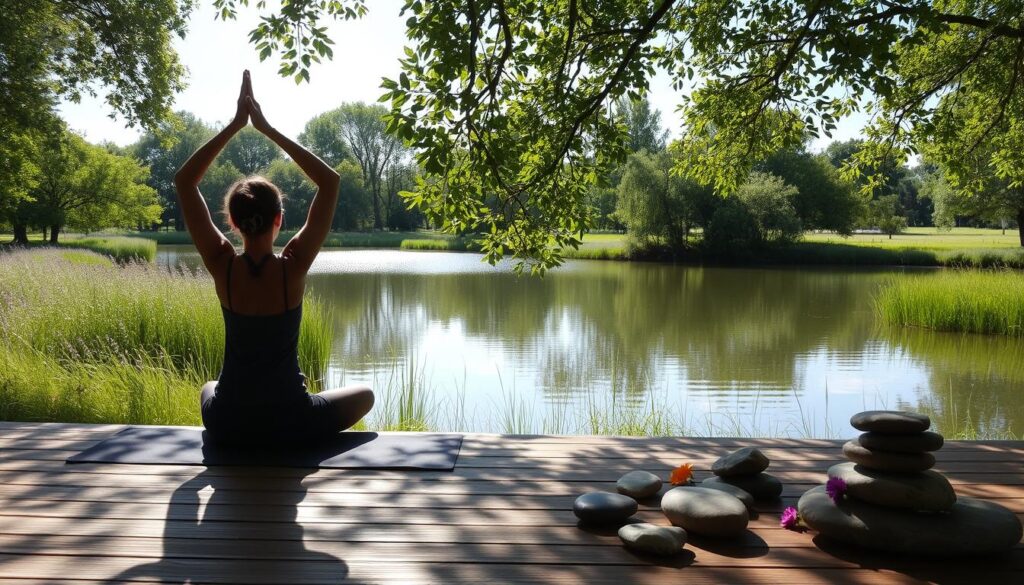In today’s fast-paced world, stress has become an omnipresent challenge that affects our physical, mental, and emotional well-being. However, there is a powerful antidote to the detrimental effects of stress: meditation. This comprehensive guide delves into the remarkable benefits of meditation for stress relief, providing you with the tools and insights to incorporate this transformative practice into your life.
Meditation, a centuries-old practice rooted in ancient wisdom, has emerged as a modern-day solution to the demands of our high-stress lifestyles. Through the cultivation of mindfulness, meditation enables us to navigate the challenges of life with greater clarity, resilience, and inner peace. By exploring the science behind meditation’s impact on stress, this guide will equip you with the knowledge and practical techniques to unlock the profound benefits of this transformative practice.
Key Takeaways
- Meditation effectively reduces stress and anxiety by regulating the body’s stress response.
- Regular meditation practice can improve sleep quality, boost immune function, and enhance overall physical and mental health.
- Meditation techniques, such as breath awareness, body scans, and mindfulness exercises, can be easily incorporated into daily life.
- Creating a dedicated meditation space and establishing a consistent routine are key to cultivating a sustainable practice.
- Meditation can lead to greater emotional balance, improved focus, and increased self-awareness, empowering individuals to navigate life’s challenges with more ease and resilience.
Understanding the Science Behind Meditation and Stress
Meditation has long been touted as a powerful tool for stress reduction and emotional well-being. But have you ever wondered about the science behind these benefits? Delving into the intricacies of how meditation affects the brain and the body’s stress response can provide valuable insights into the true power of this ancient practice.
How Meditation Affects Brain Chemistry
When you engage in meditation, your brain undergoes a remarkable transformation. Studies have shown that regular practice can lead to increased activity in the prefrontal cortex, the area responsible for mental clarity and decision-making. Additionally, meditation has been linked to a reduction in the activity of the amygdala, the part of the brain associated with the stress response.
The Stress Response and Meditation’s Impact
The human body’s stress response is a complex physiological reaction designed to help us cope with challenging situations. However, chronic stress can have detrimental effects on both our physical and mental health. Meditation has been found to have a profound impact on this stress response, helping to regulate the release of hormones like cortisol and adrenaline, which are often associated with the stress response.
Research-Backed Evidence on Meditation Benefits
Numerous studies have provided compelling evidence for the benefits of meditation when it comes to stress reduction. One study, published in the Journal of the American Medical Association, found that mindfulness meditation can significantly reduce symptoms of anxiety and depression, two common outcomes of chronic stress. Another study, conducted by researchers at the University of Wisconsin-Madison, revealed that regular meditation practice can lead to improved immune function and decreased inflammation in the body.
By understanding the science behind meditation’s impact on the brain and the body’s stress response, we can better appreciate the profound emotional well-being and mental clarity that this practice can offer. Incorporating meditation into our lives can be a powerful tool for stress reduction strategies and overall health and wellness.
Benefits of Meditation for Stress Relief: A Comprehensive Overview
Meditation has emerged as a powerful tool in the fight against stress, offering a holistic approach to managing anxiety and improving overall well-being. By delving into the benefits of this ancient practice, you’ll discover how it can transform your life and help you achieve a state of improved focus, inner peace, and anxiety management.
One of the primary benefits of meditation is its ability to reduce anxiety. Through the practice of deep breathing and mindfulness, the mind learns to let go of worrying thoughts, allowing you to experience a profound sense of calm and emotional regulation. This can lead to a significant reduction in symptoms of anxiety, as well as a greater ability to navigate stressful situations with composure.
Meditation also enhances focus and cognitive performance. By training the mind to stay present and attentive, the practice can improve concentration, memory, and decision-making skills. This heightened focus can translate to various aspects of your life, from work productivity to personal relationships.
“Meditation is not about becoming a different person, a new person, or even a better person. It’s about training in awareness and getting a healthy sense of perspective. You’re not trying to improve or change yourself, you’re just trying to wake up and become more aware.” – Jon Kabat-Zinn
Furthermore, regular meditation can foster a profound sense of inner peace and emotional well-being. By cultivating self-awareness and a deeper understanding of one’s thoughts and feelings, individuals can develop greater emotional resilience and the ability to navigate life’s challenges with a calm and balanced perspective.
The benefits of meditation for stress relief are well-documented in scientific research. Studies have shown that the practice can lower cortisol levels, the primary stress hormone, and activate the parasympathetic nervous system, which is responsible for the body’s “rest and digest” response. This can lead to improved anxiety management, better sleep quality, and enhanced overall physical and mental health.

Whether you’re seeking to manage anxiety, enhance your focus, or cultivate a deeper sense of inner peace, the transformative power of meditation can be a game-changer in your journey toward stress relief and overall well-being.
Getting Started: Essential Meditation Techniques for Beginners
Embarking on a mindfulness journey can seem daunting, but with the right meditation techniques, you can begin your path to stress relief. Whether you’re seeking to cultivate inner peace, enhance focus, or simply carve out moments of calm, these essential practices are the perfect starting point.
Basic Breathing Exercises
The foundation of many meditation practices, breathing exercises can have a profound impact on your mental and physical well-being. Start by simply observing your natural breath, noticing the inhalation and exhalation. Gradually, try extending the duration of your breaths, creating a sense of tranquility. You can also experiment with alternate nostril breathing, where you gently close off one nostril at a time, allowing the air to flow through the other.
Body Scan Meditation
Body scan meditation is a powerful tool for cultivating present-moment awareness. Begin by directing your attention to the sensations in your body, starting at the toes and slowly working your way up to the crown of your head. Notice any areas of tension or relaxation, and simply observe without judgment. This practice can help you better understand the connection between your mind and physical experience.
Simple Mindfulness Practices
Incorporating mindfulness techniques into your daily routine can be as simple as taking a few moments to pause and fully engage with the present moment. Whether it’s mindfully sipping your morning coffee, savoring a bite of food, or observing the natural world around you, these small acts of presence can have a profound impact on your mental and emotional well-being.
Remember, the key to successfully incorporating meditation into your life is to start small and be patient with yourself. With consistent practice, these techniques can become a powerful tool for stress relief and personal growth.

Creating Your Perfect Meditation Space and Routine
Crafting the ideal meditation environment is crucial for [stress reduction strategies] and [emotional well-being]. Start by selecting a quiet, distraction-free location that resonates with you. Whether it’s a cozy corner in your home or a peaceful spot in nature, this space should evoke a sense of calm and tranquility.
To enhance your meditation experience, consider incorporating soothing elements like soft lighting, calming fragrances, or gentle background music. Surround yourself with objects that hold personal significance and inspire your practice, such as natural extracts or cherished mementos.
- Invest in a comfortable seating option, such as a meditation cushion or chair, to ensure physical comfort during your practice.
- Experiment with creating a visual focal point, like a candle or a serene nature scene, to help you stay grounded and focused.
- Incorporate personal touches that make the space truly your own, fostering a sense of safety and familiarity.
Consistency is key when it comes to establishing a [stress reduction strategies] routine. Aim to practice meditation at the same time each day, whether it’s first thing in the morning or during a designated break. Start with just a few minutes and gradually increase the duration as you become more comfortable and experienced.
“The secret of change is to focus all of your energy, not on fighting the old, but on building the new.” – Socrates
Integrate your meditation practice into your daily life by finding creative ways to incorporate it into your routine. Explore techniques like mindful walking or [emotional well-being] journaling to seamlessly weave mindfulness into your day.

Remember, the key to a successful meditation practice is finding what works best for you. Experiment, be patient, and trust the process as you cultivate a [stress reduction strategies] sanctuary that nourishes your mind, body, and spirit.
Physical Health Improvements Through Regular Meditation
Meditation is not just a mental exercise; it can also have profound effects on your physical health. Regular practice of relaxation exercises and stress reduction strategies can significantly improve various aspects of your well-being, from blood pressure to sleep quality and immune system function.
Blood Pressure and Heart Health Benefits
Studies have consistently shown that meditation can help lower blood pressure levels. By reducing stress hormones and promoting a state of deep relaxation, meditation can have a positive impact on cardiovascular health. Numerous scientific trials have demonstrated that regular meditation practice can lead to a decrease in both systolic and diastolic blood pressure, ultimately reducing the risk of heart-related illnesses.
Impact on Sleep Quality
Chronic stress can often disrupt healthy sleep patterns, leading to insomnia and other sleep disorders. However, the stress-relieving effects of meditation can significantly improve sleep quality. Numerous studies have found that incorporating meditation into one’s routine can help individuals fall asleep faster, sleep more soundly, and wake up feeling more rested and refreshed.
Immune System Enhancement
Stress can take a toll on the body’s immune system, making individuals more susceptible to illness and infection. Interestingly, research has shown that meditation can enhance the body’s immune function. By reducing inflammation and promoting a state of relaxation, regular meditation practice may help strengthen the immune system, making it better equipped to fight off infections and diseases.
Incorporating relaxation exercises and stress reduction strategies through meditation can lead to tangible improvements in your physical health. From better blood pressure and heart health to improved sleep and a stronger immune system, the benefits of a consistent meditation practice are truly remarkable.

Emotional Balance and Mental Clarity Through Meditation
Meditation is not just a tool for physical relaxation – it can also have profound impacts on our emotional well-being and mental clarity. Through regular practice, individuals can experience a deeper sense of emotional balance and heightened mental focus, leading to significant stress relief.
One of the primary benefits of meditation for emotional well-being is its ability to cultivate self-awareness and self-regulation. As we quiet the mind and turn inward, we gain better insight into our thoughts, feelings, and behaviors. This heightened self-understanding allows us to respond to stressful situations with more patience, empathy, and control, rather than reacting impulsively.
Moreover, meditation has been shown to increase the production of neurotransmitters like serotonin and dopamine, which play a crucial role in regulating mood and anxiety management. By literally reshaping the brain’s neural pathways, regular meditation can lead to a greater sense of emotional balance and resilience over time.
But the benefits of meditation don’t stop there. It can also enhance our mental clarity, improving concentration, focus, and problem-solving abilities. As we train our minds to stay present and attentive, we become better equipped to navigate the complexities of daily life with a clear and focused mindset.
“Meditation helps me find the calm in the chaos of everyday life. It’s like taking a break from the mental chatter and restoring a sense of inner peace and clarity.”
Whether you’re struggling with anxiety, seeking greater emotional balance, or simply wanting to cultivate more mental clarity, the transformative power of meditation can be a game-changer. By incorporating this ancient practice into your daily routine, you can unlock a newfound sense of calm, resilience, and clarity that will positively impact every aspect of your life.
Incorporating Mindfulness into Daily Activities
Mindfulness is not just a practice confined to meditation sessions; it can be seamlessly woven into our everyday lives. By adopting mindfulness techniques, we can cultivate a greater sense of presence, focus, and stress reduction in various aspects of our daily routine.
Mindful Eating Practices
One way to incorporate mindfulness is through mindful eating. Instead of hurrying through meals, take the time to savor each bite, paying attention to the colors, textures, and flavors of your food. This heightened awareness can lead to a more fulfilling and satisfying dining experience, while also promoting better digestion and overall well-being.
Walking Meditation Techniques
Walking meditation is another accessible way to integrate mindfulness into your day. As you stroll, focus on the sensations of your body in motion, the rhythm of your steps, and the sights and sounds around you. This practice can be done during your commute, on a lunch break, or during a leisurely walk, helping to reduce stress and improve focus.
Workplace Mindfulness Strategies
Maintaining mindfulness in the workplace can be a powerful tool for managing stress and improving productivity. Simple exercises like deep breathing, desk-based body scans, or mindful breaks can help you stay grounded and present throughout the workday. Encourage your colleagues to join in, creating a culture of mindfulness that benefits everyone.
By incorporating these mindfulness techniques into your daily routine, you can unlock the benefits of improved focus, stress reduction, and overall well-being. Embrace the power of mindfulness and watch as it transforms your everyday activities into opportunities for greater self-awareness and tranquility.
Advanced Meditation Practices for Deeper Stress Relief
For those seeking a more profound level of stress relief, advanced meditation techniques can be transformative. Practices like loving-kindness meditation, transcendental meditation, and visualization exercises can lead to greater inner peace and emotional well-being. By delving deeper into these meditation methods, individuals can unlock a heightened sense of self-awareness and cultivate a profound sense of connection with the present moment.
Loving-kindness meditation, also known as metta, focuses on generating feelings of compassion and goodwill towards oneself and others. This practice can be particularly effective in reducing stress and promoting positive emotions. Transcendental meditation, on the other hand, involves the silent repetition of a personalized mantra, which can induce a state of deep relaxation and inner calm.
Visualization techniques, such as guided imagery or creative visualization, can also be powerful tools for stress relief. By picturing calming or uplifting scenes, individuals can tap into their innate capacity for self-soothing and emotional regulation. These advanced meditation practices, when practiced regularly, can lead to a greater sense of emotional well-being and a deeper understanding of one’s inner landscape.





